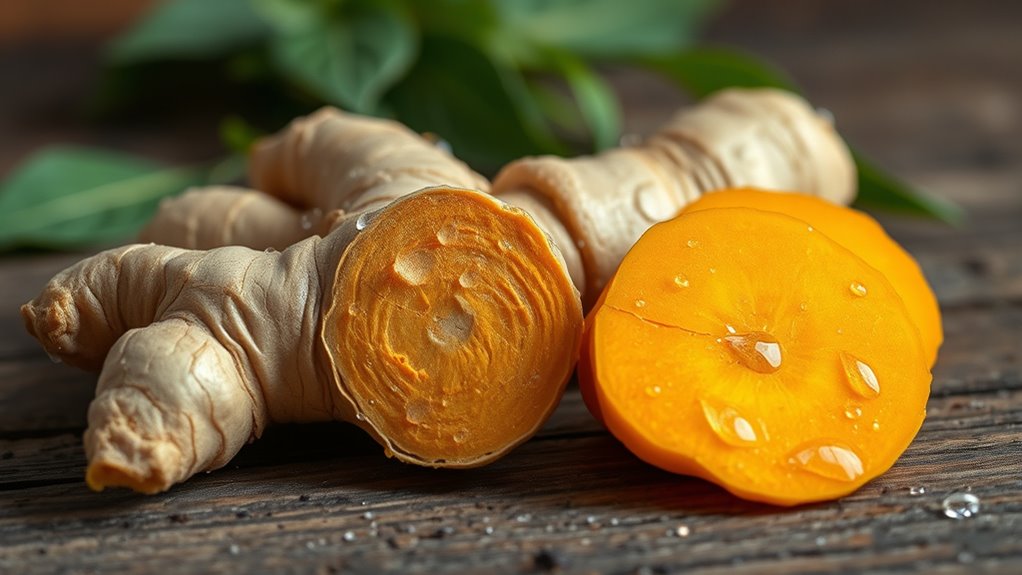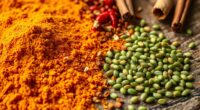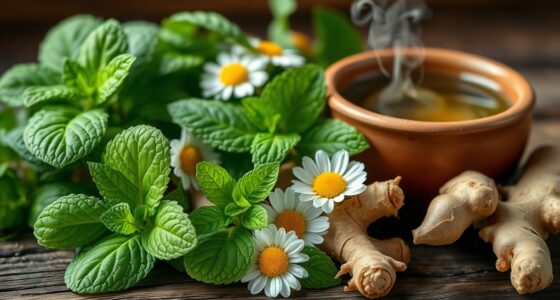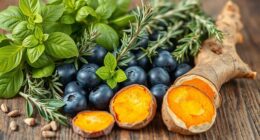Ginger provides a quicker anti-inflammatory effect because its bioactive compounds are more easily absorbed than turmeric’s curcumin, which needs enhanced preparation to boost its potency. While ginger offers rapid relief, turmeric’s benefits may take longer and require pairing with black pepper or fats for better absorption. If you want an immediate impact or are exploring effective methods, ginger might be your best choice, but understanding how to optimize turmeric’s benefits can give you even more options.
Key Takeaways
- Ginger provides quicker anti-inflammatory relief due to better bioavailability of its compounds.
- Turmeric’s curcumin offers strong long-term anti-inflammatory benefits when combined with bioenhancers like black pepper.
- Ginger’s active compounds are naturally absorbable, making it effective without complex preparations.
- Turmeric often requires enhanced formulations or fats for optimal absorption and effectiveness.
- For immediate effects, ginger generally packs a bigger anti-inflammatory punch; turmeric excels with sustained use.
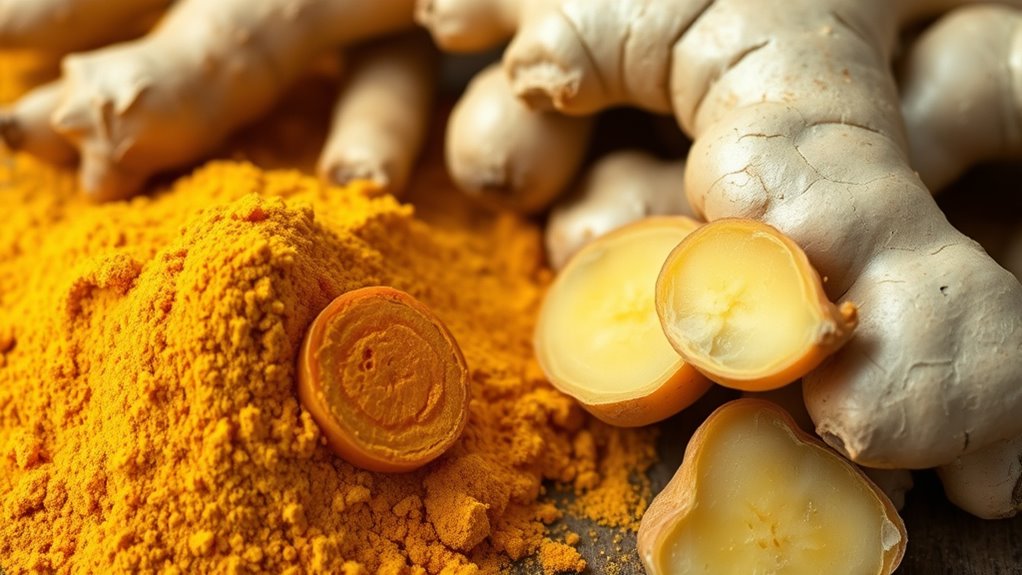
Have you ever wondered how turmeric and ginger compare when it comes to health benefits? Both are celebrated for their anti-inflammatory properties, but understanding how they work can help you decide which to include more in your diet. When it comes to turmeric, the key compound responsible for its health benefits is curcumin. However, curcumin’s bioavailability is notoriously low, meaning your body doesn’t absorb it easily. To get the most out of turmeric, you might need to combine it with black pepper or consume it with fats, which can substantially boost its absorption. This challenge in bioavailability makes it essential to consider how much you’re actually getting from turmeric supplements or dishes. Additionally, research indicates that bioavailability can be significantly improved through specific preparation methods, enhancing the effectiveness of turmeric intake.
Ginger, on the other hand, contains a variety of bioactive ginger root compounds, such as gingerol, shogaol, and paradol. These compounds are naturally more bioavailable than curcumin, meaning your body can absorb and utilize them more efficiently. As a result, ginger often provides a more immediate anti-inflammatory effect without requiring complex preparations or combinations. When you consume ginger, whether fresh, dried, or as a supplement, these compounds are readily available to help reduce inflammation and soothe discomfort.
Both turmeric and ginger work through their unique compounds to combat inflammation, but their effectiveness can depend on how they are consumed. For example, the addition of fats or black pepper to turmeric dishes can improve curcumin bioavailability, making it more potent. Ginger, by contrast, doesn’t usually need such enhancements to maximize its benefits. Its ginger root compounds are naturally accessible, allowing you to experience relief from inflammation relatively quickly.
Ginger’s bioactive compounds are naturally accessible, providing quick relief without extra preparation.
If you’re looking for a quick anti-inflammatory boost, ginger might be the more straightforward choice because of its readily absorbed compounds. However, if you’re aiming for long-term benefits or larger doses, understanding the bioavailability issues with curcumin becomes important. Supplements designed to improve curcumin absorption often include piperine (from black pepper) or other bioenhancers, which can make a noteworthy difference.
Frequently Asked Questions
Can Turmeric and Ginger Be Taken Together for Enhanced Benefits?
You can take turmeric and ginger together to enjoy synergistic effects, which may enhance their anti-inflammatory benefits. However, it’s important to contemplate dosage considerations, as combining them might require adjusting amounts to avoid potential side effects. Always consult with a healthcare provider to determine the right combination and dosage for your needs, ensuring safe and effective use of both herbs together.
Are There Any Side Effects When Consuming Large Amounts of Turmeric or Ginger?
Think of your body as a delicate garden. Consuming large amounts of turmeric or ginger without considering dosage safety can be like overwatering, risking harm. Excessive intake may cause side effects like stomach upset, heartburn, or allergy risks. Always stick to recommended doses, and consult a healthcare professional if you notice adverse reactions. Moderation guarantees your health garden flourishes without unnecessary damage from overuse.
Which Is More Effective for Specific Inflammatory Conditions?
When considering which supplement is more effective for specific inflammatory conditions, think about your needs. If you’re seeking arthritis relief, turmeric’s curcumin may be stronger due to its potent anti-inflammatory properties. For digestive health, ginger’s ability to soothe the gut might be more beneficial. Both can help reduce inflammation, but your choice depends on your primary concern. Consult a healthcare professional to tailor the best option for you.
How Do the Anti-Inflammatory Properties of Turmeric and Ginger Compare Scientifically?
Ever wonder how their biochemical mechanisms differ? Scientific research shows that turmeric’s active compound, curcumin, inhibits inflammatory pathways by blocking cytokines and enzymes like COX-2, backed by numerous clinical studies. Ginger contains gingerols, which also reduce inflammation but through different mechanisms, such as inhibiting prostaglandin synthesis. While both are effective, turmeric’s potent anti-inflammatory effects are often more supported by clinical evidence, making it a strong contender.
Can Turmeric or Ginger Interfere With Medication Therapies?
You should be aware that both turmeric and ginger can cause drug interactions, especially if you’re on blood thinners or diabetes medications. It’s important to consult your healthcare provider before adding these to your routine, as they may affect medication efficacy. Pay attention to dosage considerations, since large amounts could increase the risk of side effects or interfere with your treatment. Always follow your doctor’s advice to stay safe.
Conclusion
So, whether you’re channeling your inner Hippocrates or just seeking relief, both turmeric and ginger pack serious anti-inflammatory power. Turmeric’s curcumin rivals medieval herbal remedies, while ginger’s zing has been touted since the days of the Vikings. Ultimately, your choice depends on your taste and needs. Why not incorporate both into your diet? After all, even the ancient healers knew that nature’s medicine cabinet has plenty to offer in our modern age.

